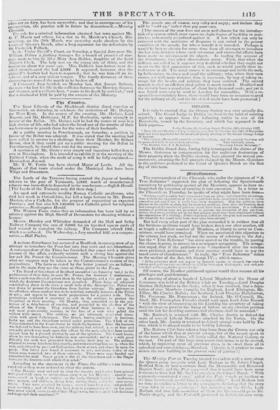Iff idrellaneaug.
The correspondent of the Chronicle, who under the signature of to A True Reformer" suggested the plan of defeating the Spottiswoode conspiracy by petitioning against all the Members, appears to have re- linquished the intention of currying it into execution. In a letter to the Chronicle on Thursday, he speaks of what might have been done-- "Nothing could possibly bare been easier than my plan; and it had this advantage. that, without the expenditure of PO/. it coal have been ascertained whether it would succeed or not, and if not, it could have been abandoned. Had the petitions been thrown in the eighth or Muth day for receiving petitions, then atter the fourteen days had tram:01.yd the number of petition: could have been ascertained. If a sufficient number of petitions were nut presented to rrevest the formation or any sue Com- mittee, then every petition got up for that purpose might have been abandoned without the expenditure of a shilling ; if there had been sufficient, the plan had succeeded, and the Grenville Act would have been, must have been altered.- But had every otlter part of the plan succeeded it is evident that all the fictitious petitions would have broken down one after another, till at length a sufficient number of Members, at liberty to serve on Com- mittees, would have remained. When we mentioned this objection to the scheme last week, we had not the means of referring to the Act; but the " True Reformer " has since spared us the trouble, by quoting the clause in point, in answer to a newspaper antagonist. The antago- nist urged, that if the petitions were " abandoned after the sureties were perfected, petitioners and their sureties would have to pay the taxed costs of abandonment." In reply, the " Trite Reformer " refers to the section of the Act, 9th George IV. ; which says- " If the petitioner shall not ay pear by hintSelr, agents, or coausel, the order fbr taking such p.ti!ion into eoosiderat, m shall be Hew-upon discharged; and such peti- tion shall nut hoe wry further pus' rte ten.'
Of course, the Member petitioned against would then resume all his privileges and qualifications.
A meeting of about a hundred Liberal Members of the House of Commons was held at the Reform Club on Tuesday,—Lord Douglas Gordon Ilallyburton in the chair ; when it was resolved, that a depu- tation of nine Members (namely, for England, Lord Ebrington, Mr. Ellice, Mr. Charles Buller ; for Scotland, Lord Douglas Hallyburton, Mr. Ferguson, Mr. Bannerman ; for Ireland, Mr. O'Connell, Mr. Shell, Mr. Fitzstephen French) should wait upon Lord John Russell " with the vices, of impressing on his Lordship the propriety of taking decisive steps to prevent the fixing of ballots on any election petition until the law for deciding controverted elections shall be amended."
Mr. Roebuck is retained with Mr. Charles Austin to defend the seats of several Liberal Admirers attacked by the Tories. On the other band, Mr. Austin is retained to defend several scats held by To- ries, which it is alleged ought to be held by Liberals.
The Reform Club have taken a long lease from the Crown, not only of the house which they at present occupy, but of the vacant spece to to the west, and the house, till lately called the National Gallery, to the east. On part of this large area a new club-house is to be erected, which, by improving upon all previous onus, is to excel them all in splendour and convenience.—Standard. [Query, is it prudent to com- mence the new building in the present state of satrties


























 Previous page
Previous page